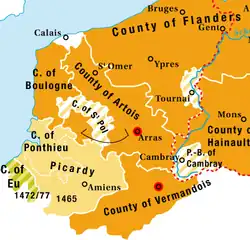County of Saint-Pol
The county of Saint-Pol (or Sint-Pols) was a county around the French city of Saint-Pol-sur-Ternoise (Sint-Pols-aan-de-Ternas) on the border of Artois and Picardy, formerly the county of Ternois.

For a long time the county belonged to Flanders, and then from the early 11th century until the end of the 12th century it remained in the hands of the Campdavaine Family, before passing to the Châtillon family then the Luxemburg family.
The best-known count was Louis, the constable of Saint-Pol. He was extradited to Louis XI of France by Charles the Bold, and in 1475 Louis beheaded him for high treason. In 1493, Saint-Pol was transferred to the Holy Roman Empire by the Treaty of Senlis ; in 1537, Emperor Charles V destroyed the capital city. The county was annexed to Artois in 1787 then France in 1790.
 House of Campdavaine
House of Campdavaine House of Chatillon
House of Chatillon House of Luxembourg
House of Luxembourg
List of counts
| COUNT | PERIOD | relation | Notes: |
| House of Flanders | |||
| Baldwin I, Count of Flanders | 862–879 | - | + Flanders |
| Baldwin II, Count of Flanders | 879–918 | son | + Boulogne, Flanders |
| Adalolf | 918–933 | son | + Boulogne |
| Arnulf I, Count of Flanders | 933–962 | brother | + Flanders, Artois |
| Arnulf II, Count of Flanders | 962–988 | grandson | + Flanders, Artois |
| Baldwin IV, Count of Flanders | 988–1035 | son | + Flanders, Artois, Zeeland (1012–) |
| House of Campdavaine | |||
| Rogier | 1031–1067 | - | |
| Hugh I | 1067–1070 | son | |
| Guy I | 1070–1083 | son | |
| Hugh II | 1083–1118 | brother | |
| Hugh III | 1118–1130 | son | |
| Ingelram | 1130–1150 | son | |
| Anselm | 1150–1174 | brother | |
| Hugh IV | 1174–1205 | son | |
| Elizabeth | 1205–1240/47 | daughter | married to John of Béthune (1228–1238) |
| House of Châtillon | |||
| Walter III of Châtillon | 1205–1219 | husband | |
| Guy II | 1223–1226 | son | de facto count |
| Hugo V | 1228–1249 | brother | |
| Guy III | 1249–1289 | son | |
| Guy IV | 1289–1317 | son | |
| John | 1317–1344 | son | |
| Guy V | 1344–1360 | son | |
| House of Luxemburg | |||
| Guy of Luxemburg-Ligny | 1360–1371 | brother-in-law | + Ligny |
| Walram III of Luxemburg-Ligny | 1371–1415 | son | + Ligny |
| Philip of Saint-Pol | 1415–1430 | grandson | + Ligny, Brabant-Limburg (1427–) |
| Johanna of Luxemburg-Saint-Pol | 1430 | great-aunt | + Ligny |
| Peter I of Saint-Pol | 1430–1433 | nephew | + Brienne |
| Louis of Saint-Pol | 1433–1475 | son | + Brienne, Ligny, Guise |
| Peter II of Saint-Pol | 1475–1482 | son | + Brienne, Soissons |
| Maria of Saint-Pol + Francis I of Bourbon-Vendôme + Francis de Bourbon, Count of St. Pol | 1482–1546 ?–1495 ?–1545 | daughter husband son | + Soissons, Enghien |
| House of Capet-Bourbon-Vendôme | |||
| François II de Bourbon-Saint-Pol | 1546 | grandson/son | |
| Marie of Bourbon-Vendôme + Leonor of Longueville | 1546–1573 ? –1573 | sister husband | |
| House of Longueville | |||
| Frans of Longueville | ?–1631 | son | count-regent |
| Henri I of Longueville | 1573–1595 | brother | |
| Henri II of Longueville | 1631–1662 | son | |
| John Louis of Longueville | 1662–1668 | son | |
| Charles of Longueville | 1668–1672 | brother | |
| John Louis of Longueville | 1672–1694 | brother | 2nd time |
| Maria of Longueville | 1694–1705 | sister | |
| 1705 sold Saint-Pol to Louis of Melun (1694–1724) | |||
External links
- Prinet, Léon Jacques Maxime (1911). . In Chisholm, Hugh (ed.). Encyclopædia Britannica. Vol. 24 (11th ed.). Cambridge University Press. p. 41.